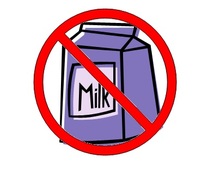 Milk, a substance that all mammals drink to grow and increase their health. Let’s think about this. For most of our human lives we don’t sit around drinking a nice cold glass of breast milk, we drink cow’s milk. Cow’s milk was designed to help an animal grow to 600 pounds in about 15 months. In the animal kingdom, all species do not drink the milk of another species, but it seems only humans do this, but is it safe? No it’s not. I’m cover the chemicals in milk such as antibiotics or hormones to show you that cow’s milk isn’t really all that healthy for us. Here is some interesting information from Dr. Sunny Kierstyn at the Fibromyalgia Care Center of Oregon. Today in America, dairy products contain residues of anything the cow consumes and/or is given as a health aid. Consequently, people who consume dairy products ingest residuals of these ingredients. Many are not good for the human system, provoking a myriad of diseases. As of 2001, the contents of each glass of milk or each bite of dairy is: 59 hormones – half of which are designed to grow and maintain a 600 lb animal. 52 antibiotics – one of which is considered to be lethal to the human and has been found during autopsy of small children. Pesticides and herbicides – remember dioxin, the most lethal herbicide on the planet? A recent study found that Ben & Jerry’s ice cream contained 22 times the safe level of dioxin… given off by the cow from the grasses it eats. Bacteria & viruses – many DO survive pasteurization. For example, the bacterium causing Crohn’s disease – mycobacterium paratuberculosis – survives pasteurization and is the only known cause of this disease. Another instance is that ‘out of nowhere. Sore throat that you wake up with every so often can usually be traced back to dairy consumption. Blood, pus, feces – yes, blood, PUS, and feces! Think about it for a moment (not to get gross here) a cow in 1975, provided 4 quarts of milk/day; in 2006, they provide 25 (!!) quarts/day. With that increase amount of milking, the skin of their udders break down and develop sores that then – due to continued usage – become infected. The residue from that inflammation cannot be separated from the flow of milk. The FDA oversees the issue with a regulation that states: “as long as there is no more than 750,000 pus cells/cc (a cc is 1/3 of a teaspoon), the milk can be sold.” The language used in the regulation is ’somatic cells’ which means pus. Incidental environmental pollutants such as strontium-90 from radioactive fallout and other organophosphates. One of things I hear from so many people is they have joint pain. In many cases they drink milk every day and this is a leading cause of inflammation, not just in your joints, but in your arteries as well. When people stop drinking milk, they soon find their joint health improve. They will have less pain and stiffness and may find their cholesterol levels go down. The best natural alternatives for cow’s milk is almond milk, coconut milk, rice milk and even oat milk. You can use them the same as cow’s milk, so enjoy and THINK NATURAL! |
Archives
May 2022
|
 RSS Feed
RSS Feed